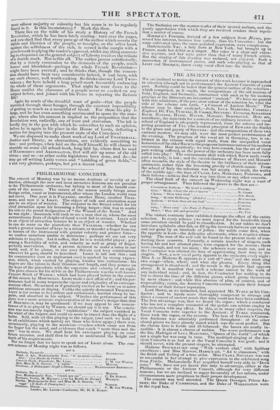PHILHARMONIC CONCERTS.
The concert of Monday was by no means destitute of novelty or at- traction, although the new and most attractive features are not peculiar to the Philharmonic orchestra, but belong to most of the benefit con- certs of the season. The return of the season usually brings some foreign artist, vocal or instrumental, after whom the London world runs
and raves. One year it is PAGANINI, another HERZ, another THAL- BERG, and now it is Luz's. The object of talk and admiration must also be an object of wonder. The conjurer in the Strand relied for his chief attraction upon his becoming a living target—this was to confer his title to the proud designation of " the Wizard of the North." And he was right : thousands will rush to see a man shot at, whom the most extraordinary feats of sleight-of-hand would fail to attract. Lwrz will be an object of attraction because he is an object of wonder. Whether be can do more on the pianofiate than THALBERG—whether he can touch a. greater number of keys in a minute, or transfer a finger from top to bottom of the instrument with greater velocity and greater force— we confess ourselves unable to determine : perhaps we are not very solicitous to inquire. Let it suffice, that he is a wonderful player ; pos- sessing a flexibility of wrist, and velocity as well as grasp of finger, perfectly marvellous. But a person destined to make a noise in our world, and, if lie please, to run over Britain and levy contributions wherever lie goes, should be described. laswr is tall and thin ; and his countenance (not an unpleasant one) is marked by strong expres- sion, which, when excited by playing, kindles into enthusiasm : his fingers are like talons in their thinness and length, and they pounce on the keys of the pianoforte with the eagerness and velocity of an eagle. The piece chosen for his d6bilt at the Philharmonic was the well-known Concert Stiick of WEISER ; which had been played before in the course of this season by MoseitELEs. LISZT made a new affair of it ; and his per- formance had in many respects the vigour and originality of an extempo- raneous effort. lie seemed as if gradually excited as he went on to more ambitious attempts at display. Unlike the quietly-demeaned THALISERG, Liszr is (or seems to be) ardent and enthusiastic, hurried along by ha- pulse, and absorbed in his subject. Whether the perfbrinauce of this piece was a more accurate representation of its author's design than that of MOSCHELES, may be questioned : if we may appeal to our remem- brance of it as played by WEBER, we should say it is not. The conclu- sion was not merely rapid, but " rapidissimo" : the subject vanished in the whirl of the fingers, and could no more be traced than the flight of a bullet. Still, with all this playing to the vulgar, (and such we hold to be all exhibitions which merely set those who listen agape,) there was, occasionally, playing to the musician—touches which came not from the finger but the mind, and evidences that much " more than met the ears" was in store. We shall hear his extempore playing on some future occasion, and shall then be able to understand the height and depth of his acquirements.
But we forgot that we have to speak not of Lisz'r alone. The con- cert-scheme of Monday night was as follows.
ACT I.
Rinfmlfn, Pastorale BEETHOVEN. Rt;it. et Air. Mademoiselle NAV, " 0 moment euelian-
tour," (l.a Muette de Portiei) AURER. Coneert.Sthek, Pianoliate, Mr. Lissa' C. M. VON M'EHER. Aria. Miss M. 11. IIAWES. " L'Addiu " MOZART.
Overture, A Midsummer Night's Dream NTENDELSSOIIN BART1101.I/Y.
ACT II.
Shemin, No. 6 Mown., Aria, Mademoiselle Nan, " Frendi per me" C. DE BERIOT. Fantasia, Violin, M. Momuus, (Sur les Motifs de Norma) MOLIQUE. Duette, Mademoiselle NAU and Miss M. B. HAWES, "'1'i veggo" (11 Reit. di Proserpina) WINTER. Overture, Oberon C. M. VON WEBER.
Leader, Mr. Loose—Conductor, Str, II. R. limier.
The Sinfonias are the master-works of their several authors, and the yearly approbation with which they are received renders their repeti- tion a matter of course.
3lomouE's Fantasia, derived of a few subjects from Norma, pos- sessed less interest, because less variety, than his Concertos : but the same cultivated taste, the same polished expression, were conspicuous. Mademoiselle NAU, a lady born at New York, but brought up in France, made her d6bUt as a singer. Her voice is a clear and exten- sive soprano, and her style purer than that of many French artists. But the singing of this evening was endured, not enjoyed. Such a succession of instrumental pieces, and such solo.playing as that of LISZT and AlouquE, threw every vocal effort into the shade.


























 Previous page
Previous page